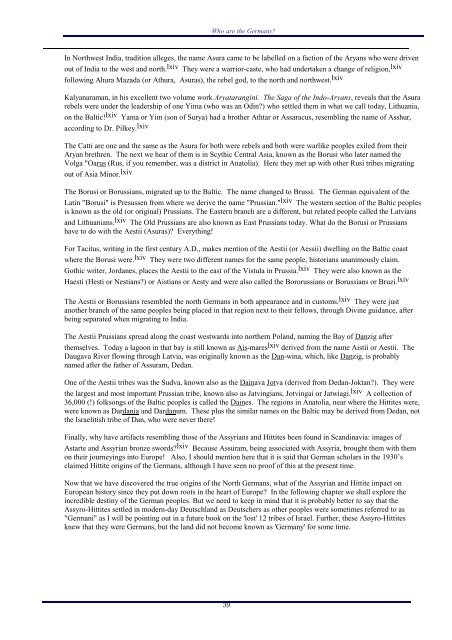WHO ARE THE GERMANS - Churches of God Cyber Auxiliary
WHO ARE THE GERMANS - Churches of God Cyber Auxiliary
WHO ARE THE GERMANS - Churches of God Cyber Auxiliary
You also want an ePaper? Increase the reach of your titles
YUMPU automatically turns print PDFs into web optimized ePapers that Google loves.
Who are the Germans?<br />
In Northwest India, tradition alleges, the name Asura came to be labelled on a faction <strong>of</strong> the Aryans who were driven<br />
out <strong>of</strong> India to the west and north. lxiv They were a warrior-caste, who had undertaken a change <strong>of</strong> religion, lxiv<br />
following Ahura Mazada (or Athura, Asuras), the rebel god, to the north and northwest. lxiv<br />
Kalyanaraman, in his excellent two volume work Aryatarangini. The Saga <strong>of</strong> the Indo-Aryans, reveals that the Asura<br />
rebels were under the leadership <strong>of</strong> one Yima (who was an Odin?) who settled them in what we call today, Lithuania,<br />
on the Baltic! lxiv Yama or Yim (son <strong>of</strong> Surya) had a brother Athtar or Assaracus, resembling the name <strong>of</strong> Asshur,<br />
according to Dr. Pilkey. lxiv<br />
The Catti are one and the same as the Asura for both were rebels and both were warlike peoples exiled from their<br />
Aryan brethren. The next we hear <strong>of</strong> them is in Scythic Central Asia, known as the Borusi who later named the<br />
Volga "Oarus (Rus, if you remember, was a district in Anatolia). Here they met up with other Rusi tribes migrating<br />
out <strong>of</strong> Asia Minor. lxiv<br />
The Borusi or Borussians, migrated up to the Baltic. The name changed to Brussi. The German equivalent <strong>of</strong> the<br />
Latin "Borusi" is Presussen from where we derive the name "Prussian." lxiv The western section <strong>of</strong> the Baltic peoples<br />
is known as the old (or original) Prussians. The Eastern branch are a different, but related people called the Latvians<br />
and Lithuanians. lxiv The Old Prussians are also known as East Prussians today. What do the Borusi or Prussians<br />
have to do with the Aestii (Asuras)? Everything!<br />
For Tacitus, writing in the first century A.D., makes mention <strong>of</strong> the Aestii (or Aessii) dwelling on the Baltic coast<br />
where the Borusi were. lxiv They were two different names for the same people, historians unanimously claim.<br />
Gothic writer, Jordanes, places the Aestii to the east <strong>of</strong> the Vistula in Prussia. lxiv They were also known as the<br />
Haesti (Hesti or Nestians?) or Aistians or Aesty and were also called the Bororussians or Borussians or Bruzi. lxiv<br />
The Aestii or Borussians resembled the north Germans in both appearance and in customs. lxiv They were just<br />
another branch <strong>of</strong> the same peoples being placed in that region next to their fellows, through Divine guidance, after<br />
being separated when migrating to India.<br />
The Aestii Prussians spread along the coast westwards into northern Poland, naming the Bay <strong>of</strong> Danzig after<br />
themselves. Today a lagoon in that bay is still known as Ais-mareslxiv derived from the name Aistii or Aestii. The<br />
Daugava River flowing through Latvia, was originally known as the Dan-wina, which, like Danzig, is probably<br />
named after the father <strong>of</strong> Assuram, Dedan.<br />
One <strong>of</strong> the Aestii tribes was the Sudva, known also as the Dainava Jotva (derived from Dedan-Joktan?). They were<br />
the largest and most important Prussian tribe, known also as Jatvingians, Jotvingai or Jatwiagi. lxiv A collection <strong>of</strong><br />
36,000 (!) folksongs <strong>of</strong> the Baltic peoples is called the Daines. The regions in Anatolia, near where the Hittites were,<br />
were known as Dardania and Dardanum. These plus the similar names on the Baltic may be derived from Dedan, not<br />
the Israelitish tribe <strong>of</strong> Dan, who were never there!<br />
Finally, why have artifacts resembling those <strong>of</strong> the Assyrians and Hittites been found in Scandinavia: images <strong>of</strong><br />
Astarte and Assyrian bronze swords? lxiv Because Assuram, being associated with Assyria, brought them with them<br />
on their journeyings into Europe! Also, I should mention here that it is said that German scholars in the 1930’s<br />
claimed Hittite origins <strong>of</strong> the Germans, although I have seen no pro<strong>of</strong> <strong>of</strong> this at the present time.<br />
Now that we have discovered the true origins <strong>of</strong> the North Germans, what <strong>of</strong> the Assyrian and Hittite impact on<br />
European history since they put down roots in the heart <strong>of</strong> Europe? In the following chapter we shall explore the<br />
incredible destiny <strong>of</strong> the German peoples. But we need to keep in mind that it is probably better to say that the<br />
Assyro-Hittites settled in modern-day Deutschland as Deutschers as other peoples were sometimes referred to as<br />
"Germani" as I will be pointing out in a future book on the 'lost' 12 tribes <strong>of</strong> Israel. Further, these Assyro-Hittites<br />
knew that they were Germans, but the land did not become known as 'Germany' for some time.<br />
39


